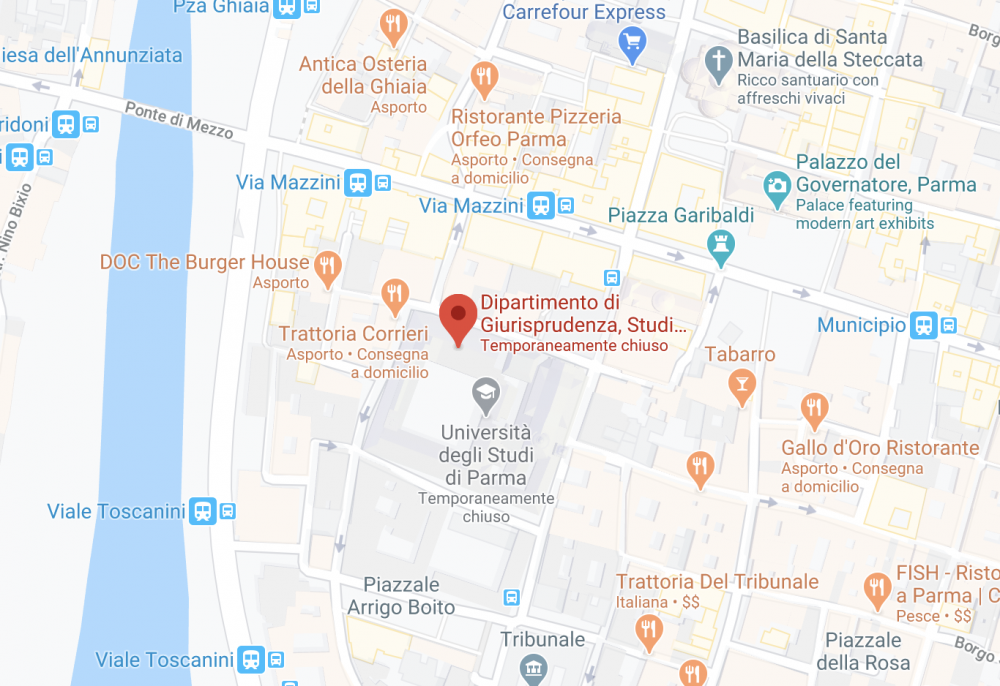Food Law, Safety and Nutrition
|
Address: Strada dell'Università, 12, 43121 Parma PR Prof.ssa Lucia Scaffardi1 - lucia.scaffardi@unipr.it Prof. Giovanni Basini1 - giovanni.basini@unipr.it Prof. Giovanni Bonilini1 - giovanni.bonilini@unipr.it Prof. Antonio D’Aloia1 - antonio.daloia@unipr.it Prof. Cesare Galli1 - cesare.galli@unipr.it Prof.ssa Laura Pineschi1 - laura.pineschi@unipr.it
Prof. Filippo Arfini3 - filippo.arfini@unipr.it Prof. Gabriele Costantino2 - gabriele.costantino@unipr.it Prof.ssa Chiara Dall’Asta2 - chiara.dallasta@unipr.it Prof. Gianni Galaverna2 - gianni.galaverna@unipr.it Prof.ssa Maria Cecilia Mancini3 - mariacecilia.mancini@unipr.it Prof. Davide Menozzi2 - davide.menozzi@unipr.it Prof. Stefano Sforza2 - stefano.sforza@unipr.it
Departments: 1- Department of Law Politics and International Studies |
HOW TO REACH US: |
Research: Food Law in a comparative perspective:
In 2019 Professor Lucia Scaffardi coordinated a project, in collaboration with the Associazione Italiana di Diritto Comparato (AIDC), culminating in the organisation of the Association's XXV Biennial Colloquium, held at the University of Parma on 23, 24 and 25 May 2019. The central theme of the meeting was food, food law, more broadly ‘food law’ in a comparative perspective, declined in a multiplicity of facets through numerous interventions (poster available at http://www.dirittocomparato.org/doc/AIDC2019.pdf). In the nine panels and two round tables organised over the three days, the following topics were addressed inter alia: trademarks and protected designations; technological innovation in the agri-food sector; the problems encountered by legislators in regulating and guaranteeing food safety; and the challenges of globalisation, from the perspectives of markets (from an economic viewpoint) and and of culture and the encounter between different food traditions, with strong repercussions on the world of production and the world of law. Presentations were given by over 40 professors, both Italian and foreign, from European Universities, such as Spain and France, from Israel, from Latin America, as well as some representatives of supranational or international institutions and organisations (EFSA and FAO, for example). The conference was attended by more than 180 participants from the academic world, but also from institutions and business companies active in the agri-food sector, thus creating a lively and interesting debate.
As a result of this very intense opportunity for discussing, the book “Cibo e Diritto. Una prospettiva comparata”, composed by two volumes spanning for over 870 pages (Lucia Scaffardi and Vincenzo Zeno-Zencovich eds) has been published. The book is available in open access on the website of the publisher, Roma TrE-Press at the links:
http://romatrepress.uniroma3.it/libro/cibo-e-diritto-una-prospettiva-comparata-volume-1/
http://romatrepress.uniroma3.it/libro/cibo-e-diritto-una-prospettiva-comparata-volume-2/
Research: Novel Food
The centrality of research in the field of Food Law has led Professor Lucia Scaffardi to investigate for some years issues related to the specific category of so-called Novel Food, thereby paying great attention not only to the legal profile, but also to interdisciplinary aspects, as well as the concrete implications for the business world. From this research, various activities were undertaken and developed:
- submission of a research project for the Bando nazionale FISR 2019, convened by MIUR, currently under evaluation. Three Universities participated to the project, namely, the University of Milan (coordinator), the University of Parma and the University of Roma Tre. The project, titled ‘Il futuro del cibo, il cibo del futuro. I Novel Food: problematiche socio-giuridiche alla luce delle conoscenze scientifiche’ involved more than 30 people, amongst them, professors and researchers, affiliated to several units – jointly with professors affiliated to foreign Universities – as well as experts in diverse disciplines and areas, i.e. legal sciences (Public Comparative Law; Private Comparative Law; International Law; EU Law; Constitutional Law; Agricultural Law; etc.), socio-economics disciplines and STEM (medicines, biology, chemistry, pharmaceutical chemistry). With regard to the University of Parma unit, Professor Scaffardi is the coodinator and the project has involved several professors affiliated to three different departments (Department of Law, Politics and International Studies, Department of Food and Drug, Department of Economics and Management), hence confirming that the project wishes to foster interaction amongst different disciplines;
- coordination of the project ‘Novel Food tra diritto e innovazione’, promoted by Professor Lucia Scaffardi at the Center for Studies in European and International Affairs (CSEIA), at the University of Parma. The project aims to analyse, also through the development of case studies, the current legislation on Novel Food, highlighting criticalities and grey areas (in terms of definition and procedure) and the uncertainties that arise for producers and applicants for marketing authorisation of novel food. The study aims to propose analyses and insights to be carried out jointly with economists and scientists;
- approval of the project ‘Sostenibilità alimentare e innovazione tecnologica: dalla carne coltivata agli insetti edibili. Legislazione europea e piano applicativo regionale, tra percezione del consumatore e regole chiare per i produttori’ within the call POR-FSE 2014/2020 ‘Alte competenze per la ricerca e il trasferimento tecnologico - DGR 2088/2019’. The project benefitted of a fund to hire a postdoctoral researcher; after a public call, the postdoctoral contract, for a period of one year, has been assigned to Dr. Giulia Formici;
- presentation and coordination (after a call by the international conference of I-CON-S Italian Chapter, Le nuove tecnologie e il futuro del diritto pubblico) of a thematic panel titled: ‘L’impatto delle nuove tecnologie nel settore alimentare tra innovazione, diritto e sicurezza’;
- publication of a Focus On for the BioLaw Journal (no. 2/2020) on the topic of Novel Food, which saw the participation and in-depth study not only in the legal field, from a public and agri-food law perspective, but also in the scientific field, with contributions on the role of EFSA, the market and consumer perception, edible insects in the circular economy, education and sustainable development. This focus On is available at this Link.
- organisation of two conferences as part of the project ‘Sostenibilità alimentare e innovazione tecnologica: dalla carne coltivata agli insetti edibili. Legislazione europea e piano applicativo regionale, tra percezione del consumatore e regole chiare per i produttori’. These two conferences, both online, were organised in cooperation with the Department of Law, Politics and International Studies, CSEIA and the School of Advanced Studies in Food and Nutrition of the University of Parma and the Emilia-Romagna Region. The first conference, titled “Novel Food e insetti edibili tra sicurezza e sostenibilità”, held on 27 May 2021, involved as invited speakers many Professors and experts in the field of Novel Food as well as entrepreneurs; the interdisciplinary approach allowed to explore diverse and overlapping strands of the theme. This interdisciplinary approach characterized the second event too, held on 27 September 2021, titled ‘Towards the future of food: the cultured meat between food safety, sustainability and public perception’, with the participations of experts from foreign Universities.
- Conference of 27 May 2021: more information and the poster at this link
YouTube Video:
- Conference of 27 September 2021: more information and the poster at this link
- Submission of a book proposal titled ‘Novel Food and Edible Insects. An Interdisciplinary Analysis’, to Springer. The volume, collecting the contributions to the Conference of 27 May 2021, wishes to deepen the law, economics and scientific profiles linked to the production and commercialisation of Novel Food in the EU, paying particular attention to regulatory challenges, consumer perception, food safety and sustainable development.
FIL 2020
Food in Legal History: knowing the legal regulation of the past to understand current food culture
Principal Investigator:
Andrea Errera
Full Professor in History of Italian Law
Federica Boldrini
Researcher in History of Italian Law
The project aims to foster research in legal history in relation to food regulation, with special reference to the application of Roman law and Canon law (ius commune) and the production both of statutory law and of jurisprudential precedents in Parma between the late Middle Ages and the early modern era. This is the first project on this topic which is based on the legal-historical approach, with the aim of describing the relation between food and law in the legal tradition of Parma. The expected outcomes of this research project will include first of all the preparation of inventories of Roman law, Canon law and statutory Law sources pertaining to food regulation, that could be published online, in a specially created website. These indexes are meant to be the basis of the subsequent creation, in the near future, of wide-ranging monographs on this subject.
Unit of Roman Law
Food in legal history: knowing the legal rule of the past to understand the current food culture concerning Roman Law
Salvatore Puliatti
Full Professor in Roman Law
Federica De Iuliis
Researcher in Roman Law
The Research in the field of Roman law will focus on the analysis of the sources of Roman law concerning the regulation of food and nutrition in the various stages of the Roman legal experience. The reconstruction of the general legal framework in the food sector will be carried out paying particular attention to the texts handed down in the Corpus Iuris Civilis, which form the basis of the subsequent evolution of the law. Further relevant sources will also be taken into consideration. All sources will be evaluated with an interdisciplinary approach, using methodologies and notions belonging to fields of knowledge that go beyond Roman law. Upon completion of the in-depth analysis on the themes of the project, all the selected sources will be cataloged.
Leading publications (max 10) of the last three years (2017-2020):
1. L. Scaffardi, V. Zeno-Zencovich (a cura di), Cibo e Diritto. Una prospettiva comparata, Vol. I – II, Roma TrE-Press, 2020, disponibili in open access all’indirizzo: http://romatrepress.uniroma3.it/libro/cibo-e-diritto-una-prospettiva-comparata-volume-1/ e http://romatrepress.uniroma3.it/libro/cibo-e-diritto-una-prospettiva-comparata-volume-2/
2. L. Scaffardi, Novel Food una sfida ancora aperta tra sicurezza alimentare, innovazione e sviluppo sostenibile, in L. Scaffardi, V. Zeno-Zencovich (a cura di), Cibo e Diritto. Una prospettiva comparata, Vol. I – II, Roma TrE-Press, 2020, pp. 735-773.
3. L. Scaffardi, I Novel Food, un futuro ancora da definire, in BioLaw Journal, n. 2/2020, pp. 43-66, disponibile in open access all’indirizzo: http://rivista.biodiritto.org/ojs/index.php?journal=biolaw&page=article&op=view&path%5B%5D=649
4. L. Scaffardi, The (false) trade-off between innovation and food safety: the impact of the European Novel Food legislation on the marketing of traditional foods from Third Countries, in S. Carmignani, N. Lucifero (a cura di), Le regole del mercato agroalimentare tra sicurezza e concorrenza. Diritti nazionali, regole europee e convenzioni internazionali su agricoltura, alimentazione, ambiente, Napoli, 2020.
5. C. Galli, Introduzione, in "Profilo giuridico del marchio collettivo privato" di D. Pettiti, Ristampe della Scuola di Specializzazione in diritto dell'Università di Camerino, 2019.
6. C. Galli, “Food and Intellectual Property Rights: A Comprehensive Approach”, in Cibo e diritto. Una prospettiva comparata, Roma, Casa Editrice Roma
TRE-Press, 2020, Vol. I, 467;
Main cooperations:
- Università degli Studi di Milano;
- CRC I-WE Centro di Ricerca Coordinata I-WE Innovation for Well-Being & Environment, Università degli Studi di Milano;
- Università degli Studi Roma Tre;
- Master Interuniversitario in Diritto alimentare (MIDAL), Università degli Studi Roma Tre;
- East China University of Science and Technology (ECUST);
- University of California Los Angeles (UCLA) School of Law’s Resnick Center for Food Law & Policy;
- Barilla Center for Food and Nutrition.

